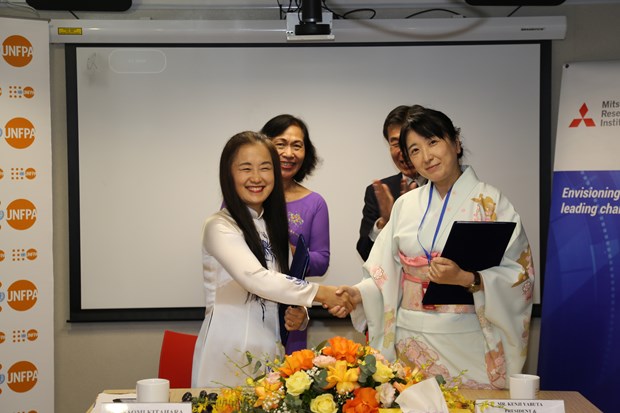UNFPA, Mitsubishi Research Institute join hands in addressing population issues in Viet Nam
VGP - A new partnership between the United Nations Population Fund (UNFPA) in Viet Nam and the Mitsubishi Research Institute (MRI) was inked to address population ageing and other emerging population issues in Viet Nam.

Naomi Kitahara, United Nations Population Fund (UNFPA) representative in Viet Nam (L) and Kenji Yabuta, Mitsubishi Research Institute (MRI) President sign a new partnership, Ha Noi, August 25, 2022 - Photo: VNA
This new partnership will focus on the issues of ageing and other population matters, such as sexual and reproductive health and rights, health care for young people, and gender equality.
Key activities include conducting joint research and communications, consulting and supporting project execution, and organizing events for public sharing of research findings and developing personnel training and exchange programs.
Other activities such as promoting public-private partnerships in the light of population ageing and emerging population trends and expanding a network of Vietnamese and Japanese entities to encourage the development of care and support for the elderly will also be carried out.
Addressing the signing ceremony, Naomi Kitahara, UNFPA representative in Viet Nam, said that following the signing event today, the plan is for both UNFPA and MRI to explore the best models for Viet Nam in providing for older persons and preparing young generations for a future in which all ages are celebrated, and no one is left behind.
Viet Nam has officially entered the "ageing phase" since 2011 and is projected to become an "aged" society by 2036. Currently, the number of older persons (60 years or over) is 12.6 million, 12.8 percent of the total population.
It is expected to increase to 22 million by 2038, accounting for 20 percent of the total population. Viet Nam is one of the most rapidly ageing countries in the world.
